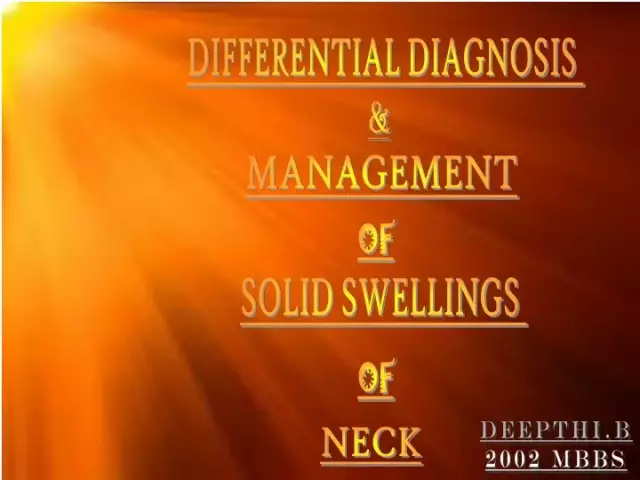- Author Rachel Wainwright wainwright@abchealthonline.com.
- Public 2023-12-15 07:39.
- Last modified 2025-11-02 20:14.
Differential diagnosis

Differential diagnosis of diseases, perhaps, is the most important thing in making the correct diagnosis. What is differential diagnosis? This is what allows you to accurately distinguish one disease from another, because many of them have similar symptoms, but a fundamentally different approach to treatment. This is why subtle, sometimes difficult to detect, differences are so important. This idea can be illustrated with a simple example. Let's take a common cold. Agree, it's hard to say that this disease is difficult to define. The diagnosis in this case lies on the surface, moreover, everyone is quite capable of making it to himself.
However, differential diagnosis of diseases is necessary in this case as well. A runny nose can be caused by a viral infection, simply speaking, a cold, or it can be the result of an allergy. Acute respiratory viral infection (ARVI) and allergies are slightly different diseases. If a complete examination is not carried out or is poorly conducted, the patient is sometimes treated for years for "chronic rhinitis", without receiving any result, unless, of course, the development of formidable complications, such as atrophy of the nasopharyngeal mucosa, is considered as the result.

The consequences of the lack of adequate differential diagnosis of cancer diseases may be even more serious. According to world statistics, about a third of all oncological tumors are not recognized at first, or rather, they are mistakenly recognized as another disease. Accordingly, people undergo a course of treatment, and sometimes more than one, for a completely different disease that they developed, and in the meantime the tumor progresses, and now precious time, so important in the treatment of cancer, has been lost …
What to do, how to conduct a thorough examination of the body? For ordinary people, the answer is: nothing. This is exactly what doctors learn not only for six years at a medical university, but also for their entire medical practice. This is exactly what for the sake of which more and more new, more and more powerful means of examining the human body are being created. Simply a diagnosis is the same as a statement: "There is a disease." The main question is which one? And this can only be answered by differential diagnostics of diseases carried out by a qualified doctor, often not by one, but by a collegium, using modern means.
Found a mistake in the text? Select it and press Ctrl + Enter.






